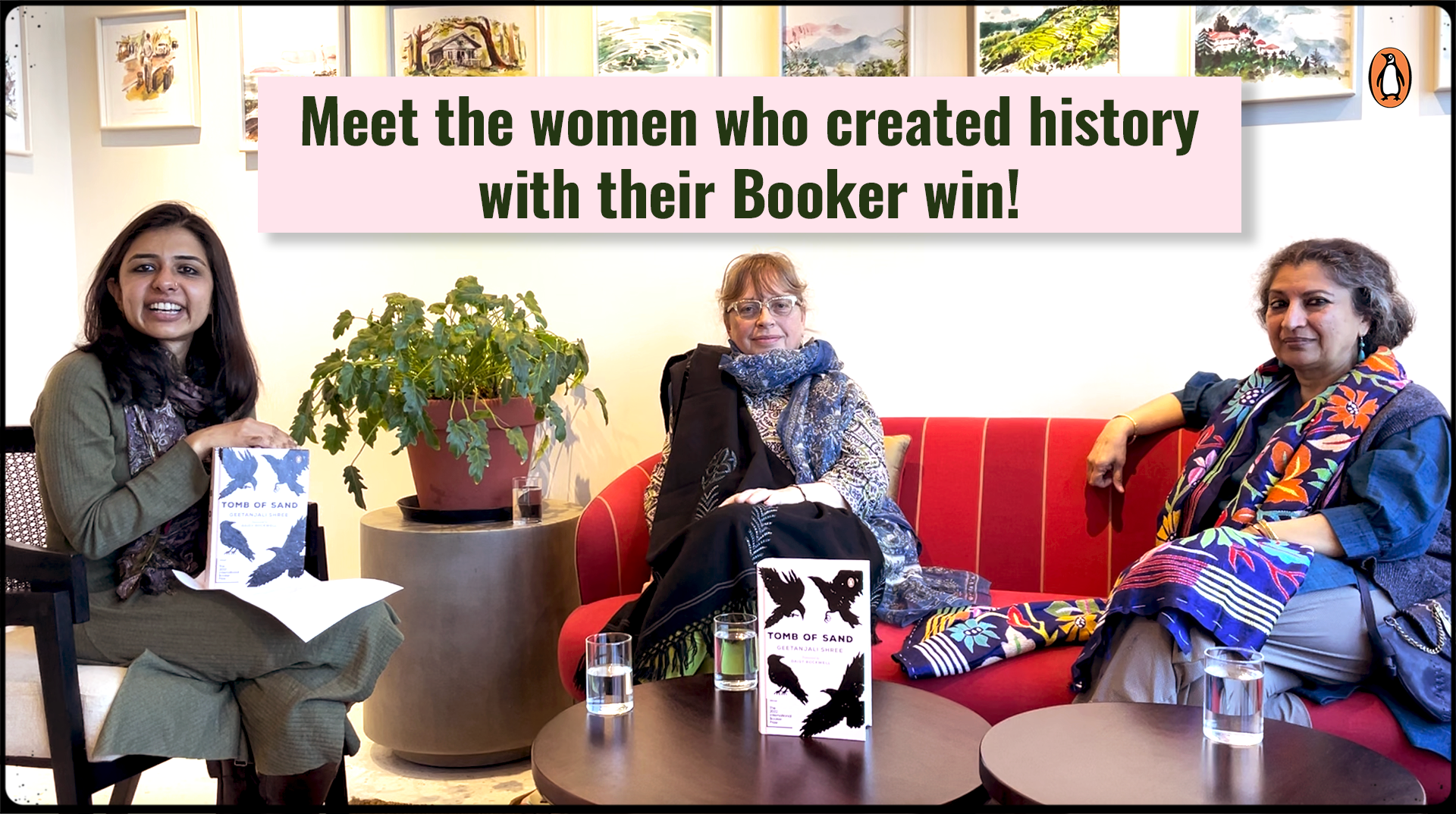The day we had all been waiting for finally arrived at our office some time ago. Our office doors swung open and in came the two women who created history by bringing to life, the first Hindi and South Asian language book to win the International Booker. We look at them like icons, but they walk in like friends, friends who’ve returned home after becoming legends. And so, we sit with them for a quick coffee, some afternoon sun, and the rush outside with all the other employees getting ready to get their books signed.
Manasi: How does it feel to have made history? What do you think this kind of international recognition will mean for Hindi literature and translation?
Geetanjali: I am not quite able to believe it, but I do know that something amazing has happened. It feels great to be the chosen one. I think this achievement just makes the larger world discover a language called Hindi and the vibrant literature that exists in Hindi and the languages around it. Hence, it is a very important moment;, there are tremendous possibilities for the world which hasn’t seen a lot of this kind of literature.
Daisy: It’s very exciting. Both of us have been working quietly for so many years, on our own. So, this is unexpected and very thrilling for us. We hope that the rest of the world will find out about all the amazing literature that comes out of South Asia. There has been translation all along, but I believe that Penguin has been bringing out a lot of translated literature since the early 1990s. Yet, it somehow never gets outside of the subcontinent. We hope that Tomb of Sand will help all these other books cross borders.
Avleen: Speaking of translations, they once said in a movie, ‘Poetry in translation is like taking a bath with a raincoat on’. But then translations also seem to be the only answers to build a world where we share our stories with each other. So, here you are trying to do the impossible. What are your thoughts on translation and what is the process like? Is it all bits daunting that we assume it to be?
Daisy: Yes, I think that’s a very negative way to look at translation. People keep asking me about the loss in translation, but I am much more interested in what we find! It is daunting but it is a very exciting experience for me! I love challenges and I love things that seem impossible to render in a language. A lot of people are even reading Ret Samadhi after reading Tomb of Sand, so, it’s taking people back to Hindi as well. So, translation for me is always about finding and discovering.
Avleen: Geetanjali, even you’ve mentioned in other interviews that the translation process often makes you look at your novel with a renewed lens. Was there ever a moment where it led to a change in your perspective or feeling regarding some aspect about the book?
Geetanjali: I don’t think it changed anything, but there was an enhancement of my perspective. A good translation brings out a lot of latent possibilities lying inside the work and that is an exciting discovery. But if it does something that changes a perspective, then it’s not a good translation. It should help in discovering something that’s there but may not be as visible or audible in the work.
Manasi: So, tell me (Geetanjali), how does writing begin for you? Is it the idea first or do you start writing and then the idea comes?
Geetanjali: Well, I don’t have a worked-out scheme. I think there’s a different trigger each time. It only happened once, when I knew I wanted to write about communalism. About Hindus and Muslims and how we seem to think that it is happening only among the uneducated in the old cities, when in fact, all of us have strange prejudices inside us no matter how liberal we consider ourselves to be. That’s the only time I had a theme in mind. Otherwise, the trigger can be anything for me! It can be an image or a wisp of a dialogue. It can be something very ordinary in daily life. And what I have discovered is that something that is ordinary is never only ordinary. It always gets linked to some very huge things. Something small sets me off and then keeps getting joined up with other things and the story keeps building, so it’s a very organic process.
Manasi: And in terms of the collaboration between the two of you, do you talk throughout the process of translation, or do you deliver a full draft to Geetanjali?
Daisy: I always do a rough and full first draft, trying not to talk to anybody at all. Even if I have a lot of questions and problems, I just write it all by hand and put notes. It’s like when you’re taking an exam, you don’t really know the answer to the first question but when you read the whole exam, you’ll find some of the answers at the end in the way the questions are asked. For example, why she’s using a particular word or why an image was used where? So, I go through the whole thing and after 2-3 drafts, I start asking her questions. LOTS of questions. And by the 5th or 6th draft, I send her the whole thing and she goes through it comprehensively and then there are more discussions. There are layers upon layers upon layers of conversations.
Geetanjali: And you know Daisy and I had not met during all of this. We just met a couple of days before the booker announcement. So, all of it was on email.
Daisy: And it’s funny because all of it was during the pandemic and it never even crossed our minds to use Zoom. People thought that we were Zooming but we never had a voice conversation!
Geetanjali: But the wonderful thing is that when we met, it didn’t feel like we were meeting for the first time. We immediately slipped into a very easy friendship.
Manasi: Because you must have such a deep level of intellectual trust ion each other for doing something so big!
Geetanjali: Yes, but we’re also very lucky! Because there was a risk. It could’ve gone any which way. And I always wonder if Daisy was very good at translation but didn’t have a sense of humour, she would’ve destroyed that book!
Manasi: So, tell me about the title? I know that one of the only things you guys had a disagreement on was the title. So, Ret Samadhi becomes Tomb of Sand. Tell us how you arrived upon it?
Geetanjali: Daisy was very wickedly supported by the publisher (laughs). I wanted the word samadhi to be in the title. And samadhi was already in the Oxford English Dictionary. And even if it wasn’t, I would’ve argued that words are constantly being taken into other languages, let samadhi go in the title. Let them learn a new word and concept. But I think Daisy and the publisher both felt, perhaps rightly so, that samadhi in the title might mislead people in bookstores to believe it is about spiritualism or yoga. They didn’t want to introduce prejudice. That argument made sense to me, but I was a bit concerned about the word ‘tomb’, because it is completely different from samadhi.
Daisy: But when I chose ‘tomb’, I was thinking about the Gandhi samadhi. Because that’s a tomb that’s not a mausoleum, but a resting place. It’s sort of giving him a Buddha-like feeling, that he’s still there somehow. But a part of the compromise is that I went all out in teaching the word ‘samadhi’ throughout the book. We have the definition right in the beginning and then I define it subtly within the text, and by the end I’m only using the word samadhi and not any of the translations of it. And I think we’re both very opinionated and confident in our opinions.
Geetanjali: But I think we also know how to be a little detached. After a point, she is the translator. She knows English, she knows what the book is.
Daisy: Yeah, I think people are always annoying Geetanjali with the question that why didn’t you write in eEnglish or why didn’t you translate your own book? And she says because Hindi is my mother tongue, why should I defend this? But if she was translating her books, she wouldn’t be writing books. That would cannibalize her work. And she doesn’t want to be a translator. And that’s part of what makes our relationship work. Because she doesn’t want to suddenly jump in and become the translator, she never wanted to be that. Our roles are clearclear, and we have a nice boundary between us.
Geetanjali: Yes, but it’s a boundary that works as a bridge, it doesn’t divide us.
As a bonus to our lovely readers, here’s a writing tip that Geetanjali Shree shared specially for you all:
Geetanjali: If you want to be a writer, you have to write.
Write, write, write.
Writing is about looking at the world, dialoguing with it, sharpening your observation, trying to notice things. So, just do that. Hone your sensitivities and look around, look inside you, think about things, be reflective, be quiet, and — write, write, write.








